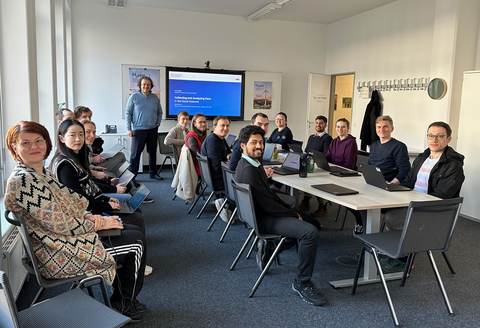Mar 01, 2024
Workshop with Prof. Hagen
On Thursday, February 29, 2024, the doctoral students were able to take part in a workshop on "Data collection and analysis in the social sciences", which was led by co-spokesperson Prof. Dr. Lutz Hagen supervisor of the E4 project . In parallel to their project work, the doctoral students fulfill the Educational Concept (16 x 15 work units á 45 minutes or 24 ECTS credits), one third of which consists of compulsory courses and two thirds of freely selectable courses, such as lectures in other subject areas, courses at the Graduate Academy or foreign language courses. This workshop was part of the compulsory third.
The workshop provided a broad overview of the topic with a focus on systematization, collection and analysis of data, and included many case studies and Prof. Hagen's own research work. Since the scientific background of many of the students is in the STEM subjects (mathematics, computer science, natural sciences, technology), which have little to do with the creation of questionnaires in education, a basic introduction to this field of work was very helpful.
A short summary: The common goals of social sciences and STEM are based on improving the quality of life of the individual and improving the functioning of a society. The integration of both disciplines can bring together technical solutions, ethical implications, informed decision making and innovative entrepreneurship.
The workshop addressed the question of how data can be collected, either through existing open access repositories (secondary data), such as the Social Science Open Access Repository (SSOAR), or through methods of observation, surveys, content analysis and experimentation (primary data). The discussion focused on the characteristics of these methods, common biases and how to avoid them when planning data collection.
How do you obtain information on your research question through surveys? The research question itself may be complex and field-specific. For a meaningful survey, the questions may need to be reformulated based on intentions and assumptions in order to obtain meaningful results. The results may vary depending on the participants' state of mind, prior engagement with the topic, knowledge of the observation, natural or artificial environment, and many other factors.
A good survey depends crucially on a well-designed questionnaire. The questions should be simple, avoid double negatives and insinuations, have a clear temporal reference, have no gaps or overlaps and take priming effects into account.
Another important workshop topic was mediatization, digitalization and its impact on data collection in scientific surveys. Online surveys have a much lower participation rate than telephone surveys used to. The representativeness of those who agree to give interviews could differ systematically from those who do not, and the media in which the surveys are conducted could also be biased by age. Mechanisms to circumvent such problems have also been proposed and discussed, including, for example, randomness and sample size. In addition, when analyzing data, care must be taken when using deduction and induction, and the laws derived from this must be viewed critically: "correlations are not causalities".
The Boysen-TUD-Research Training Group would like to thank Prof. Hagen for his time and the associated opportunity to introduce the doctoral students to the social sciences and to show them ways to incorporate them into their own research work. Multivariate statistical analysis was discussed as a possible topic for a follow-up event.

